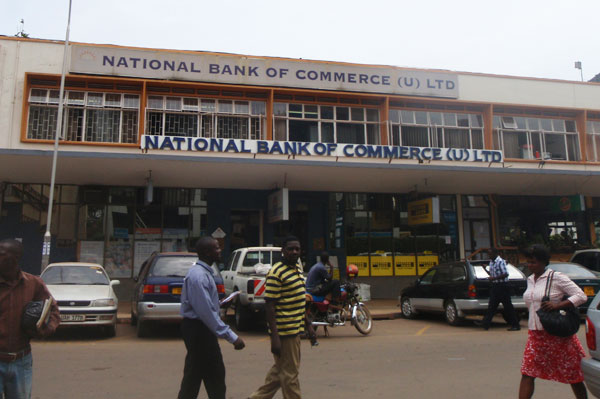The Constitutional Court has dismissed an application filed by city businessman Amos Nzeyi in which he challenged the winding up and sale of former Minister Amama Mbabazi’s National Bank of Commerce (NBC) by Bank of Uganda, which later sold it to tycoon Sudhir Ruparelia’s now defunct bank.
Nzeyi, who was a shareholder in the bank with Mbabazai, filed Constitutional Petition No. 44 of 20212 against the Central Bank and the Attorney General, arguing that the manner in which Bank of Uganda (BoU) conducted the winding up of NBC and its sale to Crane Bank was unbecoming and unconstitutional, hence he wanted revocation of the sale and reinstating of the Bank’s operating license.
However, in their judgement issued on October, 4, 2020, the Justices of the Constitution, refuted Nzeyi’s arguments and ruled that BoU officials followed due process in the winding up and sale of NBC to Crane Bank, which was later also sold to dfcu Bank by the Central Bank.
The five Justices led by Justice Geoffrey Kiryabwire concurred with whatever was done by BoU officials during the winding up and eventual sale of NBC to Crane Bank, and asserted that none of the actions undertaken by the Central Bank were illegal as claimed by the Applicant (Nzeyi).
After failing to get convinced with evidence adduced by Nzeyi, the Court ruled that the acts of Bank of Uganda (BOU) to intervene and revoke the license of NBC and then wind up it up before selling it to Crane Bank are not unconstitutional.
“It is still possible to argue that notwithstanding the law, the manner in which the act of removing management and winding up the NBC were done could have been unconstitutional. The onus to prove this, lies with the petitioner; but I find he has not been able to do so. It is not enough in my view to say that the whole process was rushed in one day,” Justice Kiryabwire held.
He added that; “hether or not the officials of BOU acted with criminal intent, or misfeasance in their handling of the closure of NBC, is a matter to be placed before a court with competent jurisdiction to hear and subject the evidence to scrutiny and arrive at an appropriate decision.”
Besides Kiryabwire, other judges who concurred with the ruling include; Cheborion Barishaki, Ezekiel Muhanguzi and Stephen Musota, although Justice Kenneth Kakuru did not agree with them, hence his position couldn’t be upheld by court.
According to Justice Kakuru, the complainant and the shareholders of the defunct NBC were entitled to redress in form of damages. However, he was unable to ascertain the compensation and damages entitled to the petitioner from the record.
Justice Kiryabwire noted in his judgement thus;
“The Financial Institutions Act has 134 Sections. No specific Section was cited in any correspondence issued by the first respondent (BoU) to National Bank of Commerce or the public as having been violated as a result of which the bank was being taken over.
I am inclined to assume that, the violation of Financial Institutions Act related to clause (a) of Section 88(1) already reproduced above. I must assume therefore that the first respondent took over the management of the National Bank of Commerce because the contravention of its activities as a bank was detrimental to the interests of the depositors. I have assumed this was the reason because I have found no other reason in the evidence before me upon which the first respondent took over the National Bank of Commerce.”
“The National Bank of Commerce appears to have been doing well until sometime in 2009 when the 1st respondent on routine on-site examination intended to determine the Bank’s capital adequacy, Assets quality, management earnings, liquidity and sensitivity to market rating was found unsatisfactory. Specifically in relation to 31st December 2010 inspection of the capital was Shs3,480,000,000/= below the statutory 0 minimum of Shs4,000,000,000/=. There was also insider lending of up to Shs1,350,000,000/= constituting 23.40 percent of the bank’s core capital and exceeding 20 percent statutory limit. Further the bank’s non-executive Directors and their related interests violated Section 34(8) of Financial Institutions Act in excess of 2.5 percent of its core capital.”
He continues that; “This appears to have been the problem, at the end of December 2010. National Bank of Commerce was required to raise Shs530,000,000/= to satisfy the minimum capital requirement, and to reduce its insider lending portfolio.
On 1st March 2011, pursuant to the Financial Institution (Revision of minimum capital requirement) S.I 13 of 2010. All Commercial Banks were required to have a minimum of Shs10,000,000,000/= as statutory capital. On 18th of May 2011, the first respondent wrote a letter to the National Bank of Commerce, expressing concerns about its unsatisfactory performance following an offsite report for the quarter ended 31st March 2011.
In 2011 the first respondent’s Governor wrote to the National Bank of Commerce Board Chairman expressing his concern over shareholders dispute that had escalated into a law suit and also about an earlier suit between minority shareholders and majority shareholders.
However, in June 2012, National Bank of Commerce was able to raise its core capital to Shs10,670,000,000/= slightly over the required minimum. This did not last long as it had fallen below the minimum by the end of August 2012. By the time it was closed it had deposits of Shs.9,500,000,000/= and a capital deficiency of Shs929,310,000/=.”
But as a form of redress in such cases in future, Justice Kiryabwire asked Parliament to improve the law embodied in the Financial Institutions Act (FIA) with regard to the management of failing financial institutions.
![]()























